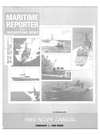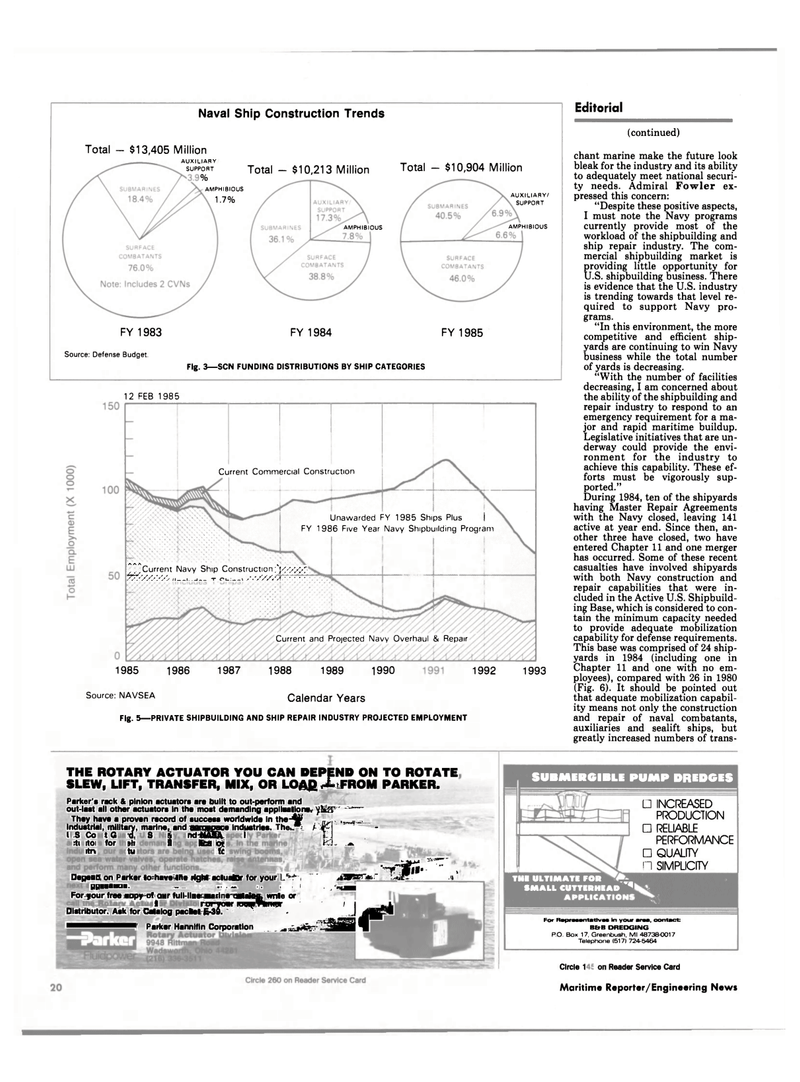
Page 18: of Maritime Reporter Magazine (February 1986)
Read this page in Pdf, Flash or Html5 edition of February 1986 Maritime Reporter Magazine
Unawarded FY 1985 Ships Plus I
FY 1986 Five Year Navy Shipbuilding Program
Current and Projected Navy Overhaul & Repair
THE ROTARY ACTUATOR YOU CAN DEPEND ON TO ROTATE
SLEW, LIFT, TRANSFER, MIX, OR LOAg^t FROM PARKER.
Parker's rack & pinion actuators are built to out-perform and out-last alt other actuators in the most demanding application*, y&T' —
They have a proven record of success worldwide In the-%' jn^us^al.^Hta^, m|rirM^and^^g^e indjwtries. The * ilp "
Depend on Parker to have the right actuator for your "'' Tlffi'"^ .1'
pp canon, ,1 SM For your free copy of^ouMuli-llne marine Distributor. Ask for Catalog packet J, jjt^Jl
mmmmmm Parker Hannifin Corporation ^.^sAO^i^l %
SUBMERCIBLE PUMP DREDGES
FY 1983 FY 1984 FY 1985
Source: Defense Budget.
Fig. 3—SCN FUNDING DISTRIBUTIONS BY SHIP CATEGORIES
For Representative* in your area, contact:
BtfB DREDGING
P.O. Box 17, Greenbush, Ml 4873&0017
Telephone 15171 724-5464
TNI ULTIMATE FOR
SMALL CUTTERHEAD 4
Editorial Naval Ship Construction Trends
12 FEB 1985
Current Commercial Construction
""^Current Navy Ship Construction "; • ^y////,,,..,..,.. -r V////A9/7//.
1987 1988 1989 1990 1985 1986
Source: NAVSEA Calendar Years
Fig. 5—PRIVATE SHIPBUILDING AND SHIP REPAIR INDUSTRY PROJECTED EMPLOYMENT
1992 1993
(continued)
chant marine make the future look
bleak for the industry and its ability
to adequately meet national securi-
ty needs. Admiral Fowler ex-
pressed this concern:
"Despite these positive aspects,
I must note the Navy programs
currently provide most of the
workload of the shipbuilding and
ship repair industry. The com-
mercial shipbuilding market is
providing little opportunity for
U.S. shipbuilding business. There
is evidence that the U.S. industry
is trending towards that level re-
quired to support Navy pro-
grams.
"In this environment, the more
competitive and efficient ship-
yards are continuing to win Navy
business while the total number
of yards is decreasing.
"With the number of facilities
decreasing, I am concerned about
the ability of the shipbuilding and
repair industry to respond to an
emergency requirement for a ma-
jor and rapid maritime buildup.
Legislative initiatives that are un-
derway could provide the envi-
ronment for the industry to
achieve this capability. These ef-
forts must be vigorously sup-
ported."
During 1984, ten of the shipyards
having Master Repair Agreements
with the Navy closed, leaving 141
active at year end. Since then, an-
other three have closed, two have
entered Chapter 11 and one merger
has occurred. Some of these recent
casualties have involved shipyards
with both Navy construction and
repair capabilities that were in-
cluded in the Active U.S. Shipbuild-
ing Base, which is considered to con-
tain the minimum capacity needed
to provide adequate mobilization
capability for defense requirements.
This base was comprised of 24 ship-
yards in 1984 (including one in
Chapter 11 and one with no em-
ployees), compared with 26 in 1980
(Fig. 6). It should be pointed out
that adequate mobilization capabil-
ity means not only the construction
and repair of naval combatants,
auxiliaries and sealift ships, but
greatly increased numbers of trans-
20 Circle 130 on Reader Service Card Maritime Reporter/Engineering News
AMPHIBIOUS AMPHIBIOUS
• INCREASED
PRODUCTION
• RELIABLE
PERFORMANCE
• QUALITY
n SIMPLICITY
AMPHIBIOUS
1.7%
Total - $10,904 Million
AUXILIARY/
SUPPORT
Total - $10,213 Million
Total - $13,405 Million
AUXILIARY
SUPPORT
%

 17
17

 19
19
